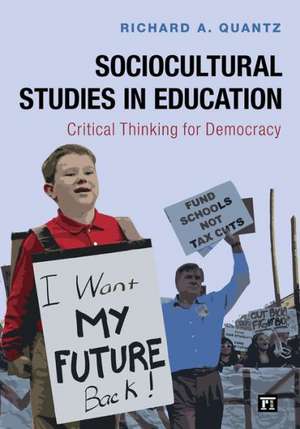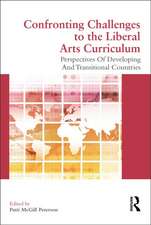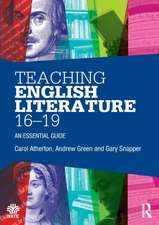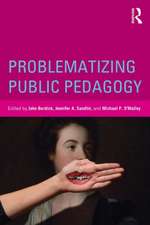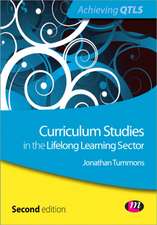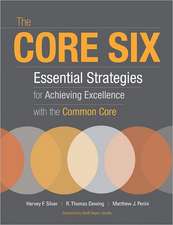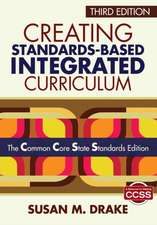Sociocultural Studies in Education: Critical Thinking for Democracy
Autor Richard A Quantzen Limba Engleză Hardback – 30 iun 2014
This book can be seen as a primer on how to read texts about education. It acknowledges that good teachers must be not only trained to teach, but also educated about education. It presents the various themes and currents found within the arguments and narratives that people use to represent public education. It assumes that the more those interested in education know about how to see through the rhetoric, the better they will be at discerning whose interests are served by which texts.
Preț: 852.22 lei
Preț vechi: 1143.09 lei
-25% Nou
Puncte Express: 1278
Preț estimativ în valută:
163.14€ • 168.16$ • 137.55£
163.14€ • 168.16$ • 137.55£
Carte tipărită la comandă
Livrare economică 28 februarie-14 martie
Preluare comenzi: 021 569.72.76
Specificații
ISBN-13: 9781612056937
ISBN-10: 1612056938
Pagini: 308
Dimensiuni: 178 x 254 x 16 mm
Greutate: 0.7 kg
Ediția:New.
Editura: Taylor & Francis
Colecția Routledge
Locul publicării:Oxford, United Kingdom
ISBN-10: 1612056938
Pagini: 308
Dimensiuni: 178 x 254 x 16 mm
Greutate: 0.7 kg
Ediția:New.
Editura: Taylor & Francis
Colecția Routledge
Locul publicării:Oxford, United Kingdom
Recenzii
“This book provides a much-needed critical examination of the sociocultural studies in education. Quantz’s rationale goes well beyond the analysis of educational philosophies and ideologies in education by placing the foci within the dynamics of ideological production that change the way we think about education and provoke highly engaging transformative work. An enormously significant work for community activists and teachers.”
—Joâo Paraskeva, University of Massachusetts–Dartmouth
“Quantz’s text should become a core part of any undergraduate’s general education program, regardless of major, as well as an integral part of teacher education programs across the country. Each chapter illuminates complex issues present in the institution of public education and the ways in which we choose to read and understand these issues. This text provides the reader with both theory and practice as it offers a way to read the world of education by analyzing, interpreting, and critiquing texts about education. In the project of democratizing education, this book is necessary as a way to make the reader think about the state of public education, as a lens through which to read about education, and as a tool to question the all-too-common rhetoric around the world of education.”
—Kimberly Haverkos, Thomas More College
“I have seen my students become better, more critical writers and, especially, more critical readers after engaging with Richard Quantz’s text. And just as importantly, my students have a much clearer vision of, and language for, education in and for democracy. This, I think, is the truest power of Quantz’s book—it helps my students understand a fuller range of possibilities as citizens and (for those who plan to teach) as teachers who can make democracy reality.”
—Kevin M. Talbert, The College of Idaho
—Joâo Paraskeva, University of Massachusetts–Dartmouth
“Quantz’s text should become a core part of any undergraduate’s general education program, regardless of major, as well as an integral part of teacher education programs across the country. Each chapter illuminates complex issues present in the institution of public education and the ways in which we choose to read and understand these issues. This text provides the reader with both theory and practice as it offers a way to read the world of education by analyzing, interpreting, and critiquing texts about education. In the project of democratizing education, this book is necessary as a way to make the reader think about the state of public education, as a lens through which to read about education, and as a tool to question the all-too-common rhetoric around the world of education.”
—Kimberly Haverkos, Thomas More College
“I have seen my students become better, more critical writers and, especially, more critical readers after engaging with Richard Quantz’s text. And just as importantly, my students have a much clearer vision of, and language for, education in and for democracy. This, I think, is the truest power of Quantz’s book—it helps my students understand a fuller range of possibilities as citizens and (for those who plan to teach) as teachers who can make democracy reality.”
—Kevin M. Talbert, The College of Idaho
Cuprins
I: Basic Concepts; 1: On Education and Democracy; 2: Understanding Culture as Text; 3: Text Critique; 4: Cultural Narratives; II: Philosophy of Education; 5: Introduction to Philosophy for Educators; 6: Philosophical Reasoning about Education; 7: Relations-Based Ethics; 8: Ethics of Social Justice; III: Ideology and Education; 9: Introduction to Ideology; 10: Political-Economic Ideologies; 11: Political-Economic Ideologies; IV: Educational Narratives in Sociocultural Context; 12: Narratives of Education in Historical Context; 13: Narratives of Social Class and Education; 14: Narratives of Race; 15: Narratives of Racism and Education; 16: Narratives of Gender and Education; 17: Narratives of Sexuality, Adolescence, and Education; 18: Conclusion
Descriere
Sociocultural Studies in Education: Critical Thinking for Democracy fills a void in the education of educators and citizens in a democracy
